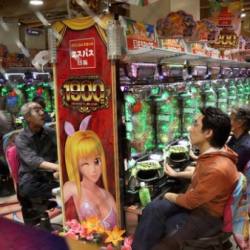
US Developers Know the Japanese Love Gambling, Because of Their Pachinko Parlor Activities
U.S. gaming companies are awaiting a forthcoming decision in Japan on whether lawmakers there will legalize casino gambling. If so, then a small number of international casino developers will be given licenses before the 2020 Olympics in Tokyo. Companies like Las Vegas Sands Corp, MGM Resorts, and Wynn Resorts all hope to be one of the license holders.
The Americans will have stiff competition from Asian casino developers, who in some cases have more money to build than their U.S. counterparts. The issue of whether casinos will be built in Japan at all still dominates considerations at present.
Liberal Democrats Want a Casino Law
At present, Prime Minister Shinzo Abe and his Liberal Democratic Party want to pass a casino gaming law. This is part of the prime minister’s plan to boost economic growth in Japan by doubling the foreign tourism trade. If the new law is passed, the Liberal Democrats believe they could increase the number of tourists per year to 20 million by the year 2020.
Japan Could Become #2 Asian Casino Destination
Japan is seen by most gaming analysts as the biggest untapped resource of casino gaming revenues in the world. Japan has the third largest economy in the world, by most measures.
Japanese residents are known to love gambling. Pachinko parlors are ubitquitous, making Japan the second largest users of gaming machines in the world, only behind the United States. Pachinko machines look like a cross between a pinball machine and slots. The games are not considered gambling under Japanese law, because winners only receive the balls used in the game. But these balls can be exchanged for cash and prizes at booths near the pachinko parlor.
Tokyo Likely to Receive Casino
Under the plan, Tokyo would receive at least one casino. Yet the people of Tokyo may stand in the way of such a plan. Tokyo governor Yoichi Masuzoe says he would have a hard time supporting such a casino.
When asked at a recent news conference, he said, “There are pros and cons. Many women in Tokyo are against the creation of casinos, and they think about the bad influences of casinos.”
Could Emulate Singapore and Macau
Proponents point to the major casino destinations of Macau and Singapore as models for what Tokyo could be. They point to the tourism boosts created when those cities began to support a casino and resort industry. Gaming companies from all over Asia and North America are ready to invest in any such projects.
What Are Integrated Casinos?
Developers would want to create “integrated resorts”. Such developments are much more than a simple casino. These resort complexes become a centerpiece of the city in which they are found. An integrated resort including a casino and hotel, but also spas, shopping areas, entertainment venues, and convention centers.
The idea is to draw in dedicated gamblers, but also the non-gamblers in their travel group who might prefer other forms of leisure and entertainment. Also, local residents would be drawn to the shops and sites found in the area. The integrated nature of the plan would make it easier for local law enforcement to police the area, keeping it safe for tourists and residents alike.
Hiroyuki Hosoda, a Liberal Democrat MP who is sponsoring the bill, told a legislative committee this week, “The intention is to increase competitiveness and enhance the attractiveness of our tourist destinations.”
Japanese Lawmakers May Not Succeed
Early in the legislative session, analysts believed a Japanese casino law was a slam dunk. Now that a deadline for a summer session decision nears, the chances are starting to look bleak for an early decision. If left to a later session, other questions could dominate the legislative cycle, while precious time could be lost in building casinos. With the manpower needed to build Olympic venues before 2020, some wonder if the city of Tokyo will have the excess manpower resources and leadership enthusiasm to build billion-dollar casinos before the 2020 due date.
Rival Plans by American Developers
With such considerations in mind, city leaders in Osaka and Yokahama are preparing to support rival plans for casino resorts. Chicago-area casino owner Neil Bluhm has ties in the Osaka area. He believes Osaka is a more natural place to build casinos, because civic leaders have the drive and know-how to make a project go quickly. Sheldon Adelson of the Las Vegas Sands Corp, who tends to think big, is still leaning towards a Tokyo casino. Meanwhile, Genting Group out of Malasyia and Melco Crown out of China (and Australia) have signalled their desire to gain casino licenses, if it should happen.
